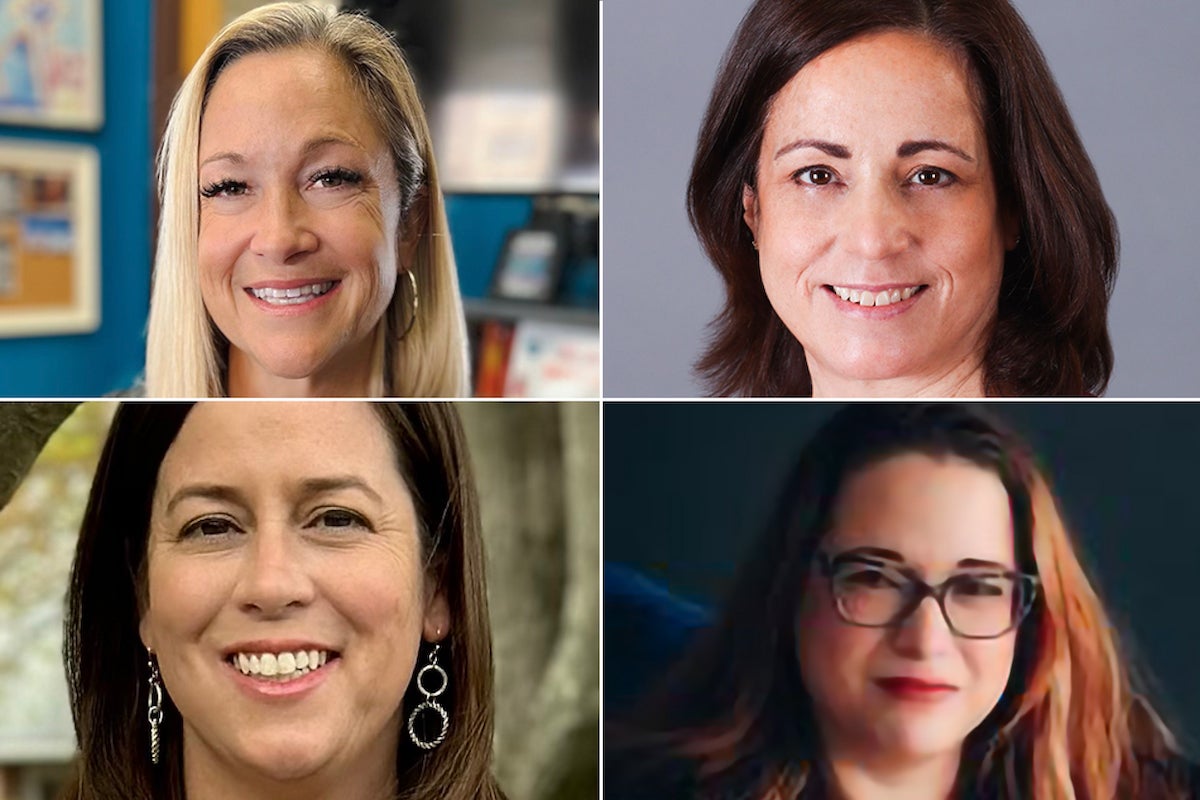Four R.I. Teachers of the Year talk about student success, issues, and challenges of teaching in today’s classrooms
What made you want to become a teacher?
That was the first question asked of four Rhode Island State Teachers of the Year in a forum hosted by the University of Rhode Island’s Feinstein College of Education, on Oct. 24 in the Center for Biotechnology and Life Sciences, that explored the issues and challenges in today’s educational settings, the traits of a successful teacher, and the best advice for new teachers.
“Tonight is about great teachers,” URI President Marc Parlange said to an audience of about 100 practicing and aspiring educators, before introducing the award-winning panelists: Ashley Adamson ’05, 3rd grade teacher at Sowams School in Barrington, 2021 R.I. Teacher of the Year; Lisa Garcia, math teacher/department head, North Kingstown high school, 2022 R.I. Teacher of the Year; Lisa Leaheey, English teacher, North Providence high school, 2023 R.I. Teacher of the Year; and Aimee Coutu ’96, K-5 instructional coach, East Providence schools, 2024 R.I. Teacher of the Year. Danielle Dennis, dean of the College of Education, moderated the discussion.
The answers to the first question varied, which set the tone for the evening’s lively discussion.
Leaheey said she wanted to be a teacher since she was a child and would assemble her stuffed animals as students in a classroom because her brother wouldn’t sit still. Coutu didn’t intend to become a teacher and said that she grew up as a struggling reader. As she evolved into the education field, her own experiences taught her not to label students because they all have individual needs and talents.
When asked about the challenges today’s educators face, the typical answers centered on state mandates, test scores, standards and policies, and ensuring that curriculums speak to a year’s growth, but the panelists expressed that the expectations of the community present the most difficulties.
“We have a mental health crisis with our students that needs to be addressed,” said Garcia.
She said that an addiction to technology underlines a large part of mental wellness, and added that many students don’t have places to live or come to school hungry, further hindering their ability to learn.
Given the negative attention of the release of the recent RICAS (Rhode Island Comprehensive Assessment System) scores, the panelists were adamant the numbers don’t tell the whole story.
“They are just a snapshot and do not say what a student can do across the board,” Coutu said.
Leaheey said that one test a year is not indicative of the day-to-day progress of students.
Garcia took a different perspective when citing that some colleges made SAT and ACT tests optional, and that there were some benefits to those tests. She also said that AI (artificial intelligence) has compromised the knowledge of basic skills.
The greatest advantage, they agreed, was developing relationships with students, that would carry them throughout their lifelong learning processes.
“We are the profession that creates all other professions,” Adamson said. “We are role models, leaders, mentors. We are today’s influencers.”
Garcia added, “We have the ability to change someone’s life.”
The need to form a community and make time for planning and sharing ideas and resources with peers were common themes in the panelists’ approach to navigating the “noise” associated with teaching.
The state Teachers of the Year winners are required to attend national conferences and special events and were asked about their favorites. Space Camp was the unanimous answer from those who attended, along with Adamson’s response of visiting the White House and Leaheey’s excitement of establishing friendships in every state with other Teachers of the Year.
The last question of the night was asked by Rowan Akerlind, a sophomore secondary education major: “What advice do you have for those entering the teaching profession?”
Garcia: “It’s impossible to be perfect. Remember, there is one student waiting for you right now.”
Adamson: “Look for the A-Ha moments, in your students.”
Leaheey: “Invite students to tell their stories. This creates communities.”
Couto: “Keep passion in your heart. You are not alone. You are excellent.”
“We can all name a teacher that changed our life for the better, and that is why we take the time to recognize the incredible work that they do every day,” said Dean Dennis.
The Teacher of the Year Award Program was initiated in 1952 by President Dwight D. Eisenhower to bring recognition to the importance of teachers as nurturers of the “American Dream.” His intention was to honor all teachers by the selection of a representative teacher from each state, who would compete in the yearly choice of a National Teacher of the Year.

